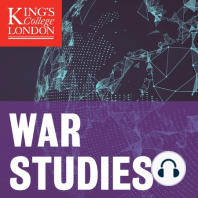40 min listen
Podcast: Extralegal Groups with Dr Christine Cheng
FromWar Studies
ratings:
Length:
37 minutes
Released:
Mar 2, 2019
Format:
Podcast episode
Description
Date of Publication: 2/03/2019
Description:
What are Extralegal groups in the context of post-conflict societies? How can trade play a role in state building? And how do we define a ‘good’ state? These are just a few questions we discussed with Dr Christine Cheng, Lecturer in the DWS and author of the recent book, Extralegal groups in post-conflict Liberia: How trade makes the state’. In her latest book, Dr Cheng writes, ‘Where the state is weak and political authority is contested, where rule of law is corrupted and government distrust runs deep, extralegal groups can provide order and dispute resolution, forming the basic kernel of the state.’ Drawing on fieldwork and socio-historical analysis, Dr. Cheng explains how extralegal groups were incentivized to provide basic forms of governance as they attempted to form a stable commercial environment during Liberia’s transition from war to peace. Her recent book has highlighted many important questions around state formation and how the West should approach post-conflict societies.
Bio:
Christine Cheng is Lecturer in War Studies at King’s College London. Her research on post-conflict transitions sits at the intersection of international relations and comparative politics (with a focus on the politics of West Africa). Dr Cheng is the co-editor of Corruption and Post-Conflict Peacebuilding: Selling the Peace? (with Dominik Zaum). Her forthcoming book on Extralegal Groups (Oxford University Press) explores how ex-combatants affected statebuilding processes after the end of civil war in Liberia. It will be published by Oxford University Press. Christine is the Course Director for the MA in Conflict, Security, and Development (CSD), and she is affiliated with King's Centre for Politics, Philosophy, and Law, and King's Gender Studies.
Christine holds a DPhil from Oxford (Nuffield College) and an MPA from Princeton University (Woodrow Wilson School). Previously, she was the Bennett Boskey Fellow in Politics at Exeter College, University of Oxford. In 2009, she was the Cadieux-Léger Fellow at Canada's Department of Foreign Affairs and International Trade. Christine has an undergraduate degree in systems design engineering (BASc) from the University of Waterloo. She has worked for the UN Commission on Human Security, the World Bank's Gender Group, Environment Canada, and the Wildlife Conservation Society. She is a commentator on international affairs for a variety of media outlets including the BBC, the Wall Street Journal, al Jazeera, Radio France International, and Real Clear World.
Christine serves as the faculty advisor for the CSD Annual Conference, as well as the student-run Strife blog and journal. She blogs at christinescottcheng.wordpress.com and tweets @cheng_christine.
Extralegal groups: https://christinescottcheng.wordpress.com/extralegal-groups/
________________________
For more news and information on upcoming events, please visit our website at kcl.ac.uk/warstudies
_________________________
This podcast was produced by Kirk Allen (Twitter: @_KirkAllen)
Description:
What are Extralegal groups in the context of post-conflict societies? How can trade play a role in state building? And how do we define a ‘good’ state? These are just a few questions we discussed with Dr Christine Cheng, Lecturer in the DWS and author of the recent book, Extralegal groups in post-conflict Liberia: How trade makes the state’. In her latest book, Dr Cheng writes, ‘Where the state is weak and political authority is contested, where rule of law is corrupted and government distrust runs deep, extralegal groups can provide order and dispute resolution, forming the basic kernel of the state.’ Drawing on fieldwork and socio-historical analysis, Dr. Cheng explains how extralegal groups were incentivized to provide basic forms of governance as they attempted to form a stable commercial environment during Liberia’s transition from war to peace. Her recent book has highlighted many important questions around state formation and how the West should approach post-conflict societies.
Bio:
Christine Cheng is Lecturer in War Studies at King’s College London. Her research on post-conflict transitions sits at the intersection of international relations and comparative politics (with a focus on the politics of West Africa). Dr Cheng is the co-editor of Corruption and Post-Conflict Peacebuilding: Selling the Peace? (with Dominik Zaum). Her forthcoming book on Extralegal Groups (Oxford University Press) explores how ex-combatants affected statebuilding processes after the end of civil war in Liberia. It will be published by Oxford University Press. Christine is the Course Director for the MA in Conflict, Security, and Development (CSD), and she is affiliated with King's Centre for Politics, Philosophy, and Law, and King's Gender Studies.
Christine holds a DPhil from Oxford (Nuffield College) and an MPA from Princeton University (Woodrow Wilson School). Previously, she was the Bennett Boskey Fellow in Politics at Exeter College, University of Oxford. In 2009, she was the Cadieux-Léger Fellow at Canada's Department of Foreign Affairs and International Trade. Christine has an undergraduate degree in systems design engineering (BASc) from the University of Waterloo. She has worked for the UN Commission on Human Security, the World Bank's Gender Group, Environment Canada, and the Wildlife Conservation Society. She is a commentator on international affairs for a variety of media outlets including the BBC, the Wall Street Journal, al Jazeera, Radio France International, and Real Clear World.
Christine serves as the faculty advisor for the CSD Annual Conference, as well as the student-run Strife blog and journal. She blogs at christinescottcheng.wordpress.com and tweets @cheng_christine.
Extralegal groups: https://christinescottcheng.wordpress.com/extralegal-groups/
________________________
For more news and information on upcoming events, please visit our website at kcl.ac.uk/warstudies
_________________________
This podcast was produced by Kirk Allen (Twitter: @_KirkAllen)
Released:
Mar 2, 2019
Format:
Podcast episode
Titles in the series (100)
Podcast: Drawing from Nuclear History to Understand Today's Challenges: Date of publication: 12/02/2019 Description: Re… by War Studies
